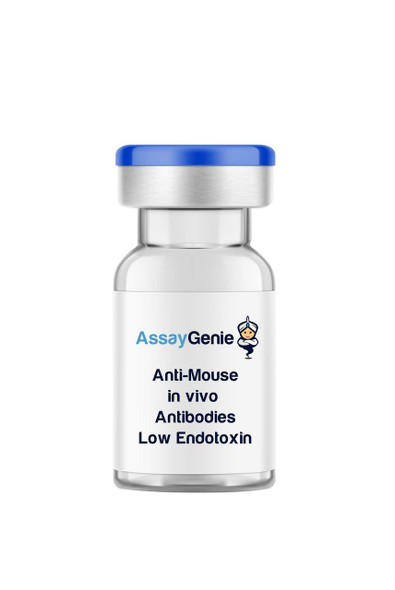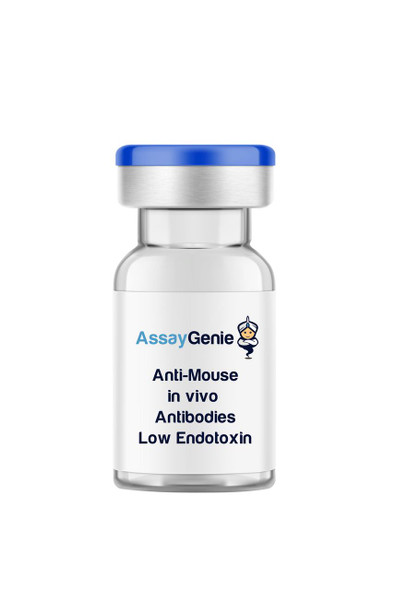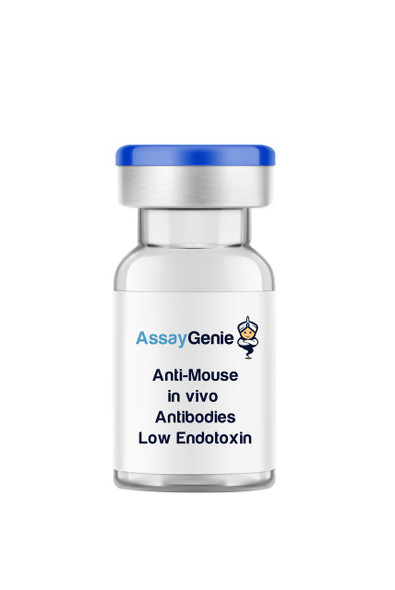Anti-Mouse PD-L2 In Vivo Antibody - Low Endotoxin
- SKU:
- IVMB0039
- Product Type:
- In Vivo Monoclonal Antibody
- Clone:
- TY25
- Protein:
- PD-L2
- Isotype:
- Rat IgG2a kappa
- Reactivity:
- Mouse
- Synonyms:
- PD-L2
- CD273
- B7-DC
- Research Area:
- Immune Checkpoint & Cancer Biology
- Endotoxin Level:
- Low Endotoxin
- Host Species:
- Rat
- Applications:
- FC
- IHC FF
- IP
- WB
Description
| Product Name: | Anti-Mouse PD-L2 In Vivo Antibody - Low Endotoxin |
| Product Code: | IVMB0039 |
| Size: | 1mg, 5mg, 25mg, 50mg, 100mg |
| Clone: | TY25 |
| Protein: | PD-L2 |
| Product Type: | Monoclonal Antibody |
| Synonyms: | PD-L2 , CD273, B7-DC |
| Isotype: | Rat IgG2a κ |
| Reactivity: | Mouse |
| Immunogen: | Purified transfected mouse B7-DC cell line |
| Applications: | FC, IHC FF, IP, WB |
| Formulation: | This monoclonal antibody is aseptically packaged and formulated in 0.01 M phosphate buffered saline (150 mM NaCl) PBS pH 7.2 - 7.4 with no carrier protein, potassium, calcium or preservatives added. |
| Endotoxin Level: | < 1.0 EU/mg as determined by the LAL method |
| Purity: | ≥95% monomer by analytical SEC >95% by SDS Page |
| Preparation: | Functional grade preclinical antibodies are manufactured in an animal free facility using only In vitro protein free cell culture techniques and are purified by a multi-step process including the use of protein A or G to assure extremely low levels of endotoxins, leachable protein A or aggregates. |
| Storage and Handling: | Functional grade preclinical antibodies may be stored sterile as received at 2-8°C for up to one month. For longer term storage, aseptically aliquot in working volumes without diluting and store at -80°C. Avoid Repeated Freeze Thaw Cycles. |
| Applications: | FC, IHC FF, IP, WB |
| Recommended Usage: | FC The suggested concentration for this CD273 antibody clone TY25 for staining cells in flow cytometry is ≤ 0.25 µg per 106 in a volume of 100 µl. Titration of the reagent is recommended for optimal performance for each application. WB |
| Reactivity: | Mouse |
| Host Species: | Rat |
| Specificity: | Clone TY25 recognizes an epitope on mouse PD-L2. TY25 does not cross-react with PD-L1. |
| Antigen Distribution: | PD-L2 is expressed on macrophages and a subset of dendritic cells (DCs). |
| Immunogen: | Purified transfected mouse B7-DC cell line |
| Concentration: | ≥ 5.0 mg/ml |
| Endotoxin Level: | < 1.0 EU/mg as determined by the LAL method |
| Purity: | ≥95% monomer by analytical SEC >95% by SDS Page |
| Formulation: | This monoclonal antibody is aseptically packaged and formulated in 0.01 M phosphate buffered saline (150 mM NaCl) PBS pH 7.2 - 7.4 with no carrier protein, potassium, calcium or preservatives added. |
| Preparation: | Functional grade preclinical antibodies are manufactured in an animal free facility using only In vitro protein free cell culture techniques and are purified by a multi-step process including the use of protein A or G to assure extremely low levels of endotoxins, leachable protein A or aggregates. |
| Storage and Handling: | Functional grade preclinical antibodies may be stored sterile as received at 2-8°C for up to one month. For longer term storage, aseptically aliquot in working volumes without diluting and store at -80°C. Avoid Repeated Freeze Thaw Cycles. |
PD-L2 antibody, clone TY25, recognizes mouse programmed death ligand 2 (PDL-2), also known as B7-DC and CD273. PD-L2 is a 42 kDa type I transmembrane glycoprotein that belongs to the B7 family of the immunoglobulin (Ig) receptor superfamily. PD-L2 is an inhibitory ligand primarily expressed on antigen-presenting cells, including macrophages and a subset of dendritic cells (DCs). Its receptor, PD-1, is expressed by CD4-CD8- thymocytes as well as CD4 and CD8 T cells, monocytes, DCs, and B cells upon activation1. Binding of PD-L2 to PD-1 on CD4 and CD8 T cells inhibits T cell receptor (TCR) signaling, negatively regulating T cell proliferation, cytokine production, and cytotoxic activity2. PD-L2 is expressed on many tumor types3,4 and is associated with unfavorable prognosis in patients with solid tumors5.
| Technical Datasheet: | View |
| Protein: | PD-L2 |
| Ligand/Receptor: | PD-1, uncharacterized receptor |
| Research Area: | Costimulatory Molecules, Immunology |






![Anti-Mouse PD-1 Antibody [RMP1-14] In Vivo - Low Endotoxin Anti-Mouse PD-1 Antibody [RMP1-14] In Vivo - Low Endotoxin](https://cdn11.bigcommerce.com/s-39x6lpnvxv/images/stencil/590x590/products/119785/117968/anti-mouse-pd-1-cd279-rmp1-14-in-vivo-antibody-low-endotoxin__18202__65875.1698937710.jpg?c=1)
![Anti-Mouse PD-1 [RMP1-30] In Vivo Antibody - Low Endotoxin Anti-Mouse PD-1 [RMP1-30] In Vivo Antibody - Low Endotoxin](https://cdn11.bigcommerce.com/s-39x6lpnvxv/images/stencil/590x590/products/120118/118301/anti-mouse-pd-1-rmp1-30-in-vivo-antibody-low-endotoxin__66897__54232.1698937870.jpg?c=1)



